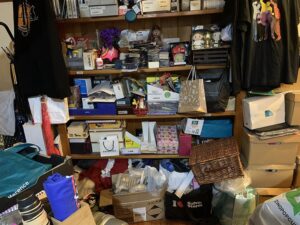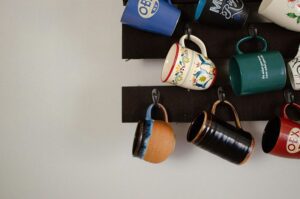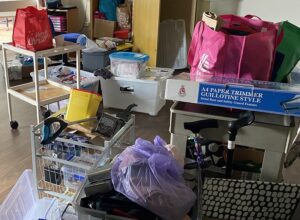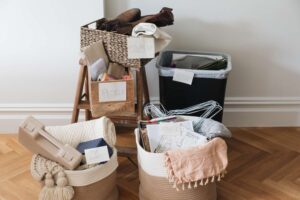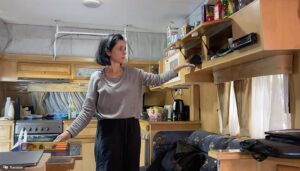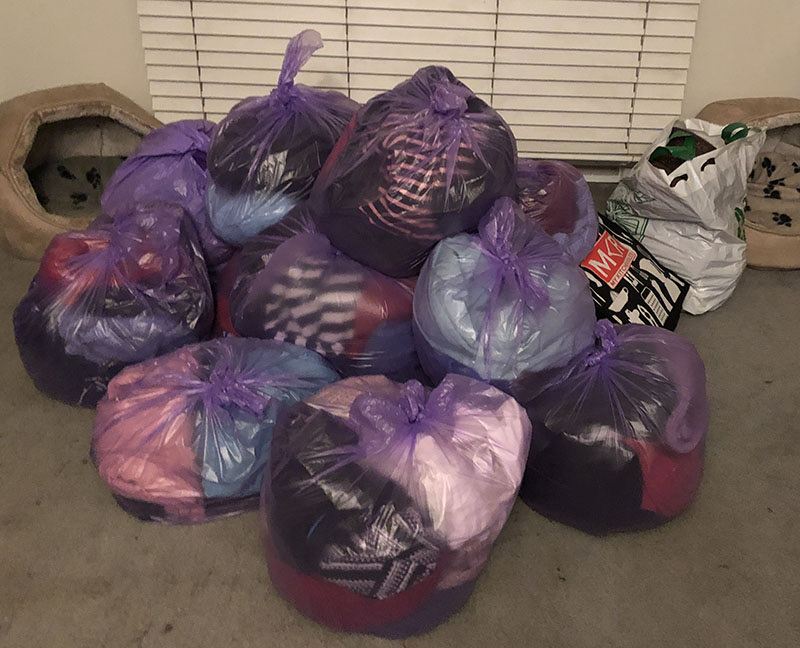
Acquiring belongings is easy. A quick scroll through Amazon or Etsy, a few hours at the shops, a Christmas. Before you know it you have armfuls of shiny new things. Letting go of stuff is the hard part.
Our attachment to material objects starts early in life. We love our things, as you know if you have ever tried to take a child’s favourite toy. When I had toddlers, anything they were clutching was described with one word – “mine”.
The Endowment Effect means that once we have owned something, we value it more. Studies have proven that we want to keep our own things far more than we want to swap for something of equal value. We also attribute our sense of self in part, to the objects we own. And for some reason we connect stuff to its owner. Why else would someone pay thousands of dollars for an item just because it was once owned by a celebrity? Humans are weird.
Loss Aversion Theory is similar but different. It is the tendency to prefer avoiding losses to acquiring equivalent gains. We go out of our way to avoid loss, even if at the same time we have a lot to gain. This translates to not wanting to let go of our belongings even though we will win back space and calm in our homes.
Belk’s concept of the Extended Self outlines how possessions become part of our identity and portray to our community who we are and who we want to be. It can be tough to let go of that.
So now what?
Letting go of stuff – how?
Think about your goal. Why are you decluttering? Why are you reading this? Maybe to live a little lighter, to downsize or to gain control of your belongings. Either way, with each item ask yourself whether keeping it brings you closer to your goal or further away.
And let’s face it, it’s never just one item. A mindset of keeping everything which has a light connection to you, means you will have full cupboards. Full cupboards means that you can no longer find things. And frequent-use items lose their place and end up on benches, floors and couches. Knowing how to let go of stuff is a big step towards reducing clutter.
Prepare for regret, because there may be a little. You can’t make an omelette without breaking a few eggs, as they say. The great thing is, omelettes are delicious. The upsides hugely outweigh the downsides. And the benefits are immediate. The regrets and negatives are hypothetical, future, and very manageable.
Play that hypothetical scene right through. Many of us fear the void that might be left behind when we discard things. The what-ifs. That moment when you want the green jumper and it’s not there. But instead of stopping your imagination at disappointment, let the story finish. What happens next? You look at a photo of it instead. You wear something else and have a good time anyway. You tell someone about your jumper instead of showing them. You might find the worst case scenario is not actually that bad.
Practice letting go of stuff. Dip your toe in and try exposure therapy for decluttering. Put some things in a box with a date on it and a reminder in your phone for two months’ time. Let your subconscious do some work in the background while the green jumper sits in the box in the garage. Chances are, you won’t need it and will stop thinking about it. Sometimes we need to do a second and third room declutter, to really nail it. We get better at it. You might even find it slightly exhilarating.
Side note: I do this ‘death row’ boxing technique with mystery technology cables. If I don’t know what they’re for I put them in a box with a date, like a time capsule. Then I discard them after a year if they have not proven useful.
Think about the real value of the item. Just because you paid $200 for it, doesn’t mean its market value is still $200. And if it is, get it onto eBay. If you are worried that it may be worth $400 in the future, keeping it only makes sense if you are prepared to keep abreast of the market. To monitor its value over the coming years. Is your space, time and mental energy worth that possible $200 gain?
And if you are considering keeping it for your unborn child or future nephew, you may be disappointed. They often won’t share your taste or values. They definitely won’t be influenced by your Endowment Effect, or the meaning the item holds for yourself.
Remember that your memories don’t reside in your items, they live in you. Nobody can take them away.
Remember that a gift was meant to make you happy, not tether you to it for life.
Trust that if everything is important, nothing is important. Keeping hold of everything that comes in, means that all of your items lose their value. Letting go of stuff makes for a more intentional, curated life. Instead of thinking about what to let go of, think of what to keep.
Examine your relationship with stuff. Try and break down the Endowment Effect and pretend you lost the item. Would you quickly replace it? If not, let it go. Remember how happy you are on holidays with just a few clothes. With just four utensils in the second drawer of the Airbnb. Letting go of stuff can get you closer to that feeling of freedom.
Then think about the cost of keeping the item versus letting it go. Is it earning its valuable real estate in your home? Providing decent return on investment? Space costs money. Even if you are not renting additional storage, perhaps the mortgage on your five-bedroom home is not as necessary as you think.
Get in touch for more insights, hands-on help letting go of your stuff and practical organising assistance.

